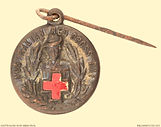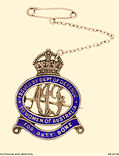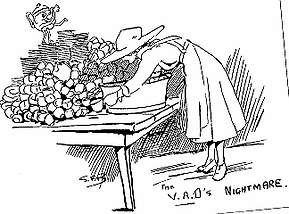Patriotic Activities
During the war, most women who undertook war work did so voluntarily ie they were not paid. They chose to undertake war related activities, believing that their contribution to the war effort made a real difference to Australia and the Diggers. Patriotism was a very strong motivating force for many women.
Women's work included many activities such as
-
encouraging enlistment
-
organizing and staging soldier farewells
-
wearing a badge to denote a particular status (sweetheart, son/s serving overseas, bereaved)
-
Writing notes and letters to serving soldiers
-
Creating gifts for serving soldiers
-
Encouraging the purchase of war bonds
-
Sewing flannel pyjamas for soldier
-
Collecting coins
-
Knitting socks, scarves, gloves, balaclavas etc
-
Making cakes and biscuits to send to soldiers in comfort packages
-
Rolling cotton bandages
-
Tending vegetable gardens to support cafes for soldiers and the families of injured and deceased soldiers
-
Entertaining soldiers with meals and snacks
-
Fund raising and charity drives through varied activities including fancy dress parties, card games, bridge, fortune telling, selling flowers and badges etc
-
Working as a VAD (Voluntary Aid Detachment) in hospitals, convalescent homes
-
Working as farm laborers
-
Supporting anxious and bereaved relatives and friends of soldiers
Watch http://aso.gov.au/titles/historical/ww1-troops-embarkation/clip3/
Much of the work undertaken by women in Australia was under the direction of voluntary organizations. Some of these organizations were very, very large, with more than 82,000 members in the Red Cross alone. These organizations required substantial organizational skills to achieve their aims. While some women's groups were smaller scale, in total, Australain women raised in excess of £14 million during the war years.
This brought some women out of the home and developed their skills in terms of networking, running meetings, co-ordination, public relations and lobbying, skills which are as useful today as they were during World War I.
Some of the key organizations included
-
Australian Red Cross
-
Australian Comfort Funds
-
Australian Women’s National League
-
Lady Mayoress' Patriotic Fund
-
Cheer-Up Society
-
Women Teachers’ Patriotic League (Victoria)
Watch the following 2 clips
-
http://aso.gov.au/titles/historical/red-cross-first-world-war/clip1/
-
http://aso.gov.au/titles/historical/red-cross-first-world-war/clip2/
Once you have read through the list of activities a patriotic woman might have undertaken in World War I, and watched the clips, choose and complete 3 of the following activities:
1. Discuss your role in a letter to a male relative on the front, including your reasons for your role (250 words)
2. Write a diary entry discussing your day's activities in support of the war effort (250 words)
3. Write a newspaper report about one or more activities undertaken by patriotic women (250 words)
4. Create the lyrics to a song about women's role/s in Australia
5. Provide a visual representation (such as a cartoon, poster, pamphlet or a sketch) showing women's role/s in Australia
Imagine you are preparing a travelling exhibition for the centenary of Gallipoli and the impact of war on the women in Australia. Choose the Australian Red Cross and at least one other organization. Prepare 2 museum captions, each of 100 words, describing the organization, its main function(s) and its importance to Australia during World War I.



VAD washing up cups of tea, from Bruce Scates and Raelene Frances, Women and the Great War, p. 60



















